Leaders extend congratulations to Afghanistan on Independence Day
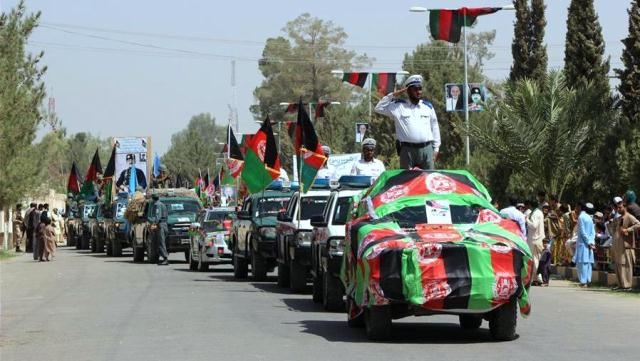
Afghans celebrate Afghan Independence Day in Lashkar Gah, the capital of Helmand province, southern Afghanistan, Aug. 19, 2018. (Photo: Xinhua)
The Vietnamese leaders sent congratulatory messages to their Afghan counterparts on August 19, on the occasion of the 99th Independence Day of the Islamic Republic of Afghanistan (August 19, 1919-2018).
According to the Ministry of Foreign Affairs, State President Tran Dai Quang cabled a congratulatory letter to his Afghan counterpart, Ashraf Ghani Ahmadzai, on Sunday.
On the same day, Deputy Prime Minister cum Foreign Minister Pham Binh Minh sent a congratulatory message to Afghan Foreign Minister Salahuddin Rabbani.
Vietnam extends condolences over former UN Secretary-General’s death
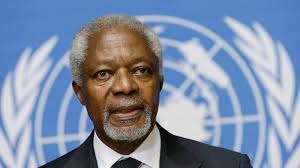
Former UN Secretary-General Kofi Annan.(Photo: Reuters)
Deputy Prime Minister and Foreign Minister Pham Binh Minh on August 19 cabled a message of condolences to UN Secretary-General Antonio Guterres and Ghanaian Minister of Foreign Affairs and Regional Integration Shirley Ayorkor Botchway over the death of former UN Secretary-General Kofi Annan.
Kofi Annan, who had served as Secretary-General of the United Nations for 10 years, passed away on August 18 at the age of 80.
He was considered a bright star in international relations, who had brought new vitality to the UN after two terms of leadership.
He was also recognised by analysts and politicians as one of the most outstanding Secretary General in the UN history.
Vietnam, Indonesia look towards deeper strategic partnership: Ambassador
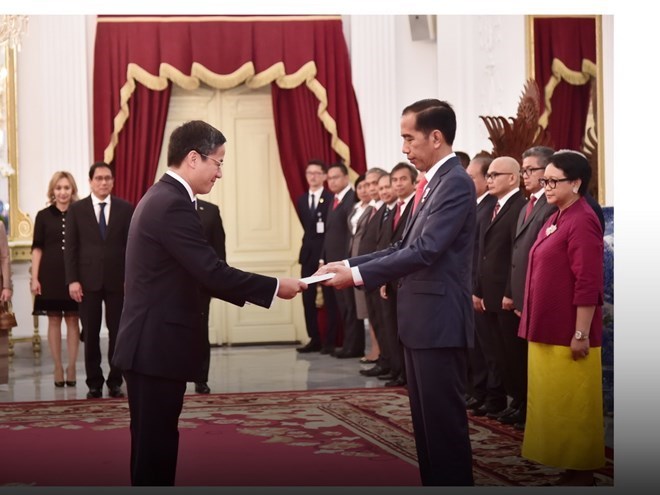
Vietnamese Ambassador to Indonesia Pham Vinh Quang (left) presents credentials to Indonesian President Joko Widodo (Source: Antara)
Vietnam and Indonesia are looking to promote political and diplomatic relations, towards further deepening their strategic partnership that enjoyed great achievements over the last five years, Vietnamese Ambassador to Indonesia Pham Vinh Quang has said.
In a recent interview granted to Indonesia-based Vietnam News Agency’s correspondents, Ambassador Quang highlighted common points in the two countries' foreign policies and pointed out what the two sides need to do in order to lift their bilateral relations.
He stressed the necessity to form new cooperation mechanisms, including expanding the exchange of visits at the deputy defence minister level and accelerating the signing of Memorandum of Understandings (MoUs) and cooperative agreements between their naval and coastal guard forces; as well as to strengthen bonds between Vietnam’s Ministry of Agriculture and Rural Development and Indonesia’s Ministry of Maritime Affaires and Fisheries.
Over the last five years, besides visits by high-ranking leaders of the two countries, their Foreign Ministers also regularly visit each other and conduct regular meetings of the Bilateral Cooperation Committee at the foreign ministerial level.
The two sides also have a cooperative mechanism within the Joint Committee on Economic, Scientific and Technological Cooperation. Cooperation has been also established among their ministries and sectors across the fields from defence, security to culture, tourism and people-to-people exchange.
Two-way trade between Vietnam and Indonesia recorded a sudden expansion, increasing fourfolds in the 2012-2017 period with an annual average growth of 6.5 percent. In 2017, their trade hit 6.7 billion USD, representing a year-on-year increase of 16 percent.
In the coming time, Vietnam will take concrete measures to lift the bilateral trade turnover to 10 billion per year, while working with Indonesia to remove barriers and create favorable conditions for Vietnam's farm produce to enter the Indonesian market.
The two sides are also seeking to promote and increase investment in each country, focusing on infrastructure development.
Vietnam has experience in hydropower plant construction, while Indonesia is lacking in energy.
Vietnam can also send its labourers to Indonesia to carry out large projects, Quang said, adding that the two countries have potential to foster tourism and education link, and culture exchange.
The diplomat also highlighted the significance of the upcoming State visit by Indonesian President Joko Widodo to Vietnam in September and his attendance at the World Economic Forum 2018, saying that it aims to review achievements of the strategic partnership reached during the last five years and define new cooperation orientations and action coordination in the political and diplomatic fields.
The two countries have planned to sign an Action Plan for the next five years, aiming to make the bilateral relations stronger in the context that their relationship is enjoying many opportunities and also facing challenges.
In the context of complicated regional developments, Vietnam and Indonesia share common views not only on regional security but also at different forums, the ambassador noted, stressing that these are opportunities for the two sides to enhance action coordination.
According to the diplomat, Vietnam and Indonesia can work together in the United Nations Security Council. In 2018, Indonesia has been elected as a member of the UN Security Council and since early 2019 will assume the role of a non-permanent member of the UN Security Council. Vietnam is also likely to become a non-permanent member of the UN Security Council one year later , so both countries will have many opportunities to work together.
Indonesia leads in ASEAN in some areas, and Vietnam is also actively promoting links within the cooperation mechanism, with their common goal of enhancing solidarity among ASEAN member nations and increasing the bloc’s contributions to maintaining peace and security in the region and the world, including East Sea-related issues.
Vietnam and Indonesia shared a common view of peacefully settling the disputes in the East Sea in line with legal process and with respect to international law, including the United Nations Convention on the Law of the Sea (UNCLOS) in 1982, Quang noted.
The two sides may cooperate at other multilateral forums which both Vietnam and Indonesia are members, he said.
According to the diplomat, the two countries can also work together on a number of negotiation process to promote trade liberalization.
Quang, however, pointed out a fact that there are some issues that need to be resolved, including those concerning fishermen.
The two sides have agreed that there are no major differences or contradictions in this regard, he said, noting that Vietnam and Indonesia have made progress in the work as the two countries signed an agreement on the demarcation of continental shelf in 2003.
This is an important step and now the two countries are continuing negotiations on the demarcation of the exclusive economic zones to ensure that both sides can effectively exploit marine resources, Quang said.
Regarding the fisherman-related work, Indonesia and Vietnam agreed on the basis of cooperation and humanitarian treatment in the spirit of the long-lasting friendship between the two countries, he added.
Grand ceremony marks President Ton Duc Thang’s 130th birthday
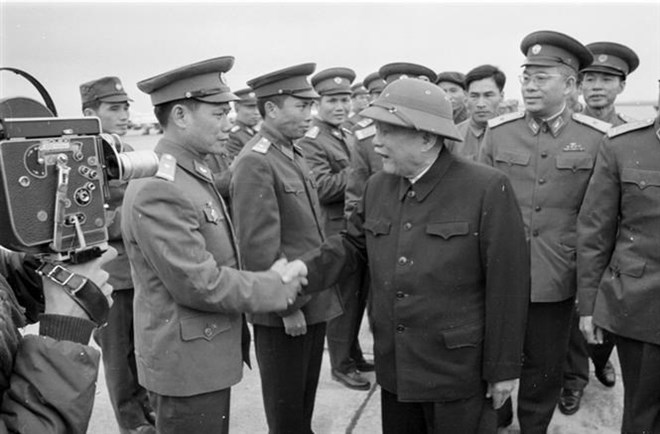
The 130th birthday anniversary of President Ton Duc Thang was marked at a grand ceremony held on August 20 in the late President’s home village in the Mekong Delta province of An Giang.
Prominent among delegates at the event were President Tran Dai Quang, head of the Party Central Committee’s Commission for Education and Popularisation Vo Van Thuong, National Assemby Vice Chairman Uong Chu Luu and many incumbent and former senior officials of the Party, the State, the Vietnam Fatherland Front.
Party General Secretary Nguyen Phu Trong and Prime Minister Nguyen Xuan Phuc sent baskets of flowers to the ceremony.
President Tran Dai Quang delivered a speech, looking back at the life and revolutionary career of the late President, also known affectionately as Uncle Ton.
Born on August 20, 1888 at Ong Ho islet, An Hoa village, now My Hoa Hung commune of Long Xuyen city, An Giang province, Ton Duc Thang joined the patriotic movement against the French colonialists since young age. During the time working abroad, he participated in workers’ movement in France, the rising of the French Navy in the Black Sea in support of the October Revolution in Russia.
Returning to Vietnam in 1920, the late President founded the first workers’ union in Vietnam and led the worker’ movement in Sai Gon, with the Ba Son strike being the most typical example of the movement’s activities. He then joined the Vietnam Revolutionary Youth's Union and was entrusted with several key positions. He was arrested by the French colonialists in 1929 and was imposed 20 years of hard labour in prision. In Con Dao prison, he was among the founders of the first Party cell in prison.
With the success of the August Revolution, Ton Duc Thang regained his freedom and immediately joined the resistance war against the French invaders. He was assigned many important missions by the Party, and in any position, Ton Duc Thang fulfilled his duty, setting a bright example of patriotism, firm revolutionary will, loyalty and revolutionary ethics.
His great contributions to the Vietnamese revolution, the world peace movement and international friendship had won recognition in the form of many noble order and awards. He was the first person to be conferred with the Sao Vang (Golden Star) Order by the Vietnamese Party and State. He was also awarded with the Lenin Order and the Lenin Prize of the Soviet Union.
President Tran Dai Quang stressed that with nearly 70 years engagement in the Vietnamese revolution, 26 successive years serving as President of the Lien Viet Front and the Vietnam Fatherland Front, and more than 10 years holding the Presidency of the nation, Uncle Ton’s 92-year life and revolutionary career was a bright example of patriotism, devotion to the revolutionary cause, firm will and revolutionary ethics.
On behalf of the Party organisation, administration and people of An Giang province, Secretary of the provincial Party Committee Vo Thi Anh Xuan said the province is proud of the land’s son Ton Duc Thang.
In Ho Chi Minh City, a delegation of the city’ Party Committee, People’s Council, People’s Committee and Vietnam Fatherland Front offered incense and floral tribute to the late President Ton Duc Thang at the museum dedicated to him on the occasion of his birthday.
The museum is holding a display on the childhood of President Ton Duc Thang, with around 100 exhibits showing the situation in An Giang province and the southern region in late 19th and early 20th centuries.
Many delegations of local organisations and people also paid tribute to the great leader at the museum.
Cooperatives’ quantity, quality must go together: Deputy PM
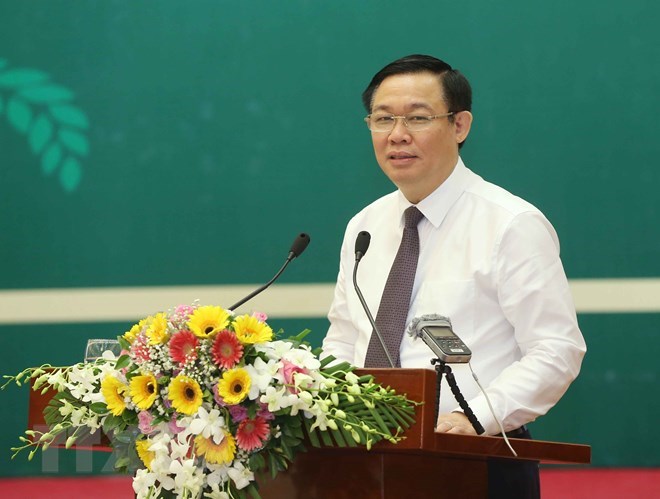
Deputy Prime Minister Vuong Dinh Hue has emphasised the importance of ensuring quality and effectiveness of agricultural cooperatives, instead of pursuing formalism in their establishment.
He made the remark at a meeting on August 18 that discussed policies about linking production and consumption of agricultural products and the development of 15,000 agricultural cooperatives and cooperative unions by 2020.
Deputy PM Hue, who also leads of the Steering Committee for Innovation and Development of Collective Economy and Cooperatives, said thanks to various efforts by authorities at all levels and sectors, the collective economy and cooperatives have got rid of prolonged weaknesses and begun to flourish, making up 5.6 percent of total GDP.
With the current development trend, the target of 15,000 cooperatives by 2020 is quite reachable, he noted.
The National Assembly issued Resolution 32/2016/QH14 on continuing to improve the implementation of the national target programme on building new-style rural areas in association with agricultural restructuring. Meanwhile, Decision 461/QD-TTg of the Prime Minister aims at developing 15,000 effective agricultural cooperatives and cooperative unions by 2020.
He said the two documents stress not only the quantity but also the quality of cooperatives, and utmost efforts must be made to achieve that goal.
It is necessary to keep promoting the quality the 4,400 cooperatives with effective operations, and 1,500 of them must apply high technology. Meanwhile, the weak ones must improve themselves to operate effectively by 2020, the official added.
Hue also underlined the need to continue improving public awareness, especially among Party members, officials and farmers, of the plan on setting up 15,000 cooperatives.
Setting up cooperatives is a compulsory task with farmers being the key player to develop large-scale agricultural production, he noted.
According to a report of the Ministry of Agriculture and Rural Development, by the end of June, there had been 39 cooperative unions and almost 12,600 cooperatives working in the agricultural sector. More than 1,140 cooperatives were set up in the first half of this year.
A survey of 9,266 agricultural cooperatives in 2017 showed that only 12 percent of them operated well while another 12.4 percent performed poorly.
The ministry admitted that some localities have established cooperatives only to meet the 13th target of the new-style rural area building programme while ignoring their operation effectiveness. Some cooperatives have been set up but only waited for the State’s support.
At the meeting, Vice Chairman of the People’s Committee of the Central Highland Lam Dong province Pham S suggested focusing on hi-tech and smart agriculture while pushing ahead with trade promotion to enhance competitiveness. He also called on the Government to facilitate cooperatives’ access to capital to reach the target of 15,000 cooperatives by 2020.
Meanwhile, Vice Chairman of the People’s Committee of central Nghe An province Dinh Viet Hong asked for specific policies on the establishment of cooperatives in mountainous and ethnic minority areas.
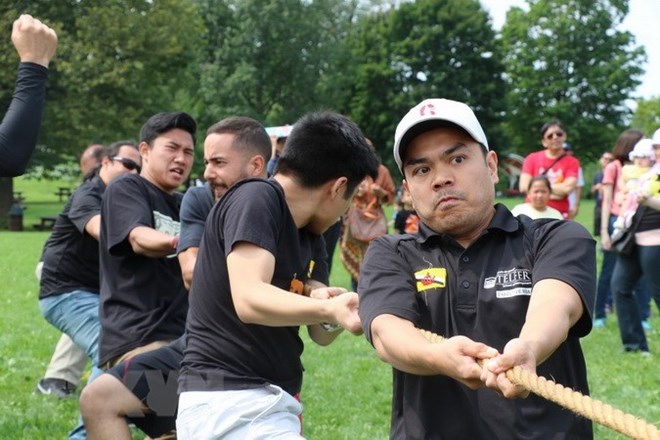
"Tug of war" is one of the games held at the festival to promote team spirit
Embassies of Brunei, Indonesia, Malaysia, Myanmar, the Philippines, Thailand and Vietnam in Canada jointly held the ASEAN Festival at the Vincent Massey Park in Ottawa on August 18.
Hundreds of staff members from the ASEAN countries’ representative agencies in Canada participated in the annual event.
Chairman of the ASEAN Committee in Canada and High Commissioner of Brunei Pengiran Haji Ahmad said the festival was designed to honour the spiritual values of ASEAN and increase exchanges and connectivity between the bloc and Canada.
A range of sports and games were held for both children and adults, promoting team spirit.
Festival goers could also taste traditional dishes from the ASEAN member states.
Founded in 1967, the 10-member ASEAN groups Brunei, Cambodia, Indonesia, Laos, Malaysia, Myanmar, the Philippines, Singapore, Thailand and Vietnam.
An Giang requested to promote sustainable economic development
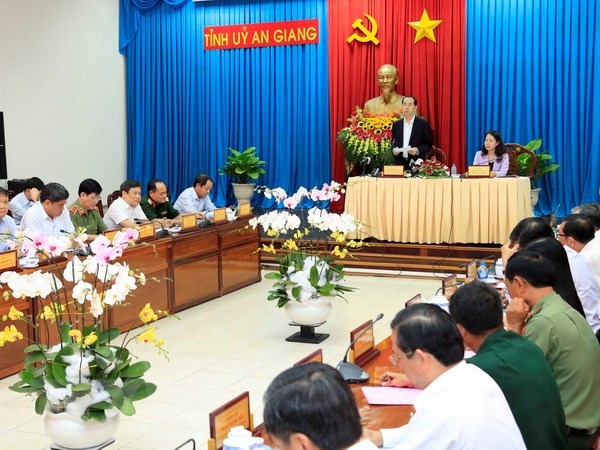
President Tran Dai Quang has urged authorities of the Mekong Delta province of An Giang to focus on improving the quality of infrastructure planning for socio-economic and urban development, and effectively mobilising and using resources to promote its rapid and sustainable economic development.
During a working session with provincial leaders on August 19, President Quang asked the province to pay more attention to training human resources, speeding up administrative reform, improving the investment environment and enhancing scientific and technological application in agriculture and processing industry.
He also asked for An Giang to invest more in developing infrastructure of industrial parks and transport infrastructure, form regional connectivity and accelerate the building of new-style rural areas.
The State leader stressed the need for An Giang to reform its agricultural growth model, change the structure of agricultural production, promote the development of hi-tech agriculture, and devise policies to encourage enterprises to invest in the field of farm produce preserving and processing, towards creating high-value agricultural products.
It is also necessary to pay heed to preventing and overcoming landslides, minimising impacts caused by saline intrusion and water shortage and controlling diseases in cattle and poultry, he noted.
President Quang requested An Giang to effectively implement a the Politburo’s Resolution on developing tourism into a spearhead economic sector by calling for investment in infrastructure development for tourism, and efforts to promote the province’s tourism potential and landscapes, thus attracting both investors and tourists.
He emphasised that An Giang must focus on building strong and comprehensive armed forces; well implementing the coordination mechanism among forces in safeguarding national sovereignty, border security and security in the fields of ethnicity and religion; as well as enhancing the efficiency of foreign affairs with localities of neighbouring countries, thus helping to build a boundary of peace and friendship.
The President also requested An Giang authorities to strengthen the Party building; promote the campaign of studying and following the thought, morality and lifestyle of President Ho Chi Minh; build a transparent and professional public administration; and foster administrative reform to make it easy for investors’ production and business activities.
With nearly 100 km of border lines shared with Kandal and Takeo provinces of Cambodia, An Giang has a strategic position in terms of defense-security in the southwestern border region and it is also one of the four provinces lying in the Mekong Delta region’s key economic zone.
In 2017, An Giang’s GRDP growth reached 5.11 percent with GRDP per capita hitting over 34.3 million VND per year. The province’s budget revenue posted a year-on-year increase of 13 percent and its export turnover reached 820 million USD.
In the first half of 2018, the GRDP growth stood at 6.1 percent, higher than the same period of many previous years; and its investment attraction also recorded positive results.
So far, 33 out of 119 communes in An Giang have met criteria of the National Target Programme on New Rural Development, and the rate of poor household reduced to only 5.24 percent.
Along with efforts for promoting economic and infrastructure development, the local authorities also pay attention to implementing many social welfare policies, thus battering the living conditions of the locals.-VNA